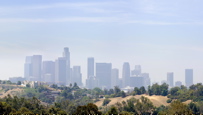News
The latest news on this change — carefully culled from the world wide web by our change agents. They do the surfing, so you don't have to!
- Browse:
- Recent
- Popular
- Diet and Fitness
Grab a Mask Before You Sweat

Summer weather brings the luxury of warm early-morning runs and sunset walks, an indulgence that many exercisers look forward to when heading outside. But if you live in an area like Los Angeles where the smog can be so thick you can cut it, you might want to think twice about exercising outside.
Smog is comprised of particles of smoke, exhaust and toxins that literally hangs in the air, and breating in this air during a workout can cause coughing, a burning sensation in your lungs and shortness of breath. Health experts say that’s because muscles need more oxygen to work through smog, and an exerciser’s breathing rate can increase by about seven times. The end result means the lungs are exposed to double or triple the amount of intoxicated air.
If you're not interested in working out indoors, it's best to monitor your local air quality index. AirNow.gov is a great site for looking up the air quality index in your area. An index of 101 to 150 is considered unhealthy for people who are sensitive to air toxins, including exercisers with heart or lung disease. These people should reduce outdoor activity.
An index of 151 to 200 is considered harmful, indicating that everyone should steer clear of exercising outdoors if it lasts more than an hour. Extremely unhealthy air—an index of 201 and above—is an indicator that no one should engage in outdoor activity.
When you're outside, try to breathe through your nose, a natural filtration system for your lungs. But when you do hit the great outdoors for a sweat session, do what’s comfortable for you—even if it does mean incorporating a little mouth breathing. [Los Angeles Times]







